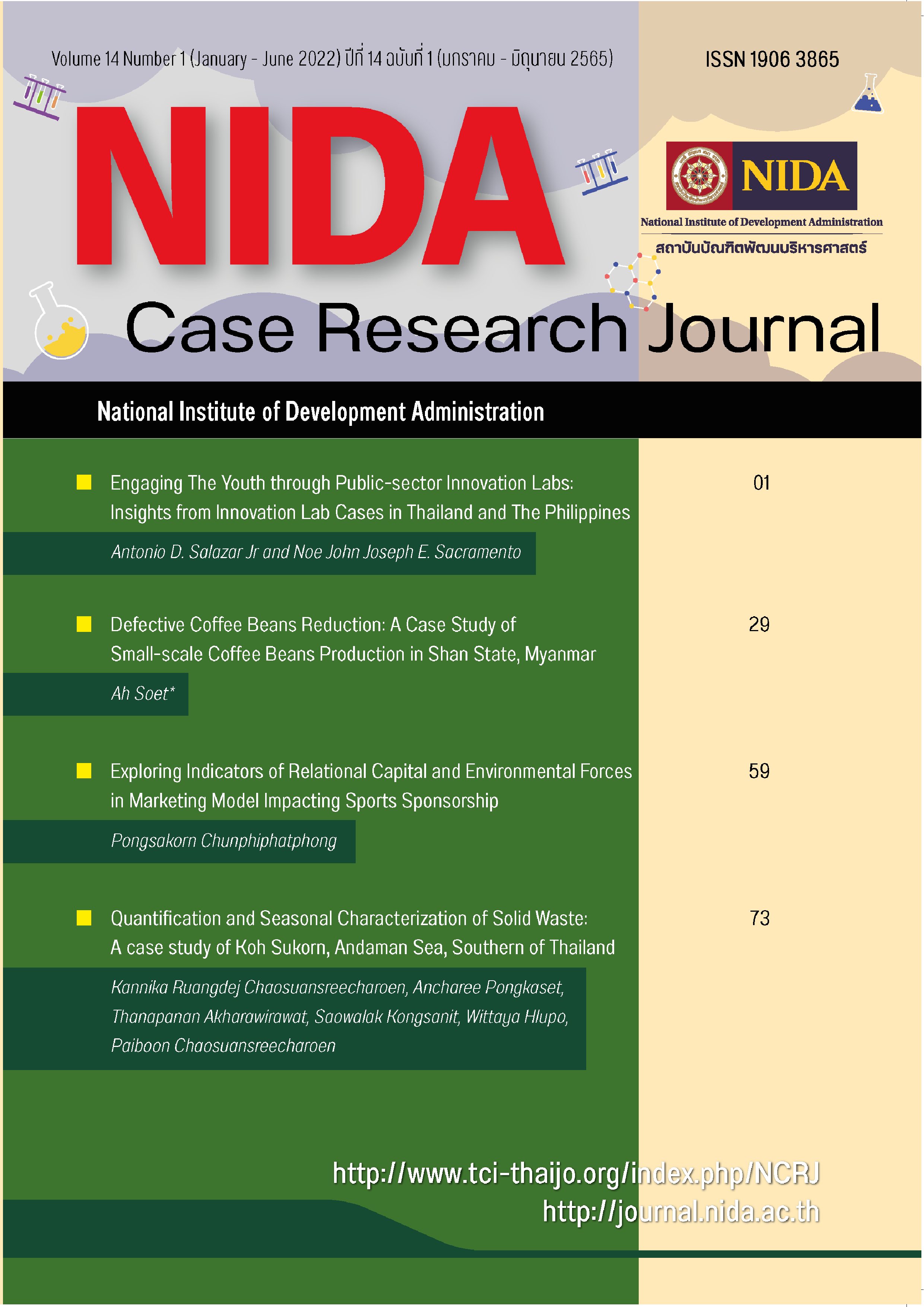Exploring Indicators of Relational Capital and Environmental Forces in Marketing Model Impacting Sports Sponsorship
Keywords:
Relational Capital, Sports Sponsorship, Marketing Model, Environment ForcesAbstract
Indicators of the relational capital and environmental forces in the marketing scenario explored in the study were surveydevelopment for Thailand’s corporate businesses through relational capital. The inclusive research objective was the development and validity check of a marketing model impacting sports sponsorship from 645 marketing executives on sports sponsorship. The statistics of SPSS (16.0) and Amos (6.0) analysis were used for interpretation. They used descriptive statistics and the techniques of CFA and PLS in the research study. Scenario findings indicate that the relational capital and environmental forces model in marketing were aligned with historical academic reviews comprising 43 indicators. Each factor has a constructed validity value that passed more than 0.60, and the extract validity constructed reliability value passed more than 0.40. Finding indicators expected to support the path to sports sponsorship success locally, regionally, and globally through relational and environmental strategies. Overall, relational capital and environmental forces in marketing had a significant effect on performance. The findings might help stakeholders implement relational and environmental marketing properly and reallocate resources appropriately.
References
Arbuckle, J. L. (2012). IBM SPSS AMOS 21 user's guide. Chicago, IL: IBM Software Group.
Bacon, J. (2015). How sport sponsorship is joining the digital age: MW Marketing Week [Online]. Retrieved June 22, 2023 from https://www.marketingweek.com/how-sport-sponsorship-is-joining-the-digital-age/
Bollen, K. A. (2014). Structural equations with latent variables. Germany: Wiley.
Calderón-Monge, E., & Ramírez-Hurtado, J. M. (2022). Measuring the consumer engagement related to social media: The case of franchising. Electronic Commerce Research Springer, 22(4), 1249-1274.
Cheung, M. L., Pires, G. D., & Rosenberger, P. J. (2019). Developing a conceptual model for examining social media marketing effects on brand awareness and brand image. International Journal of Economics and Business Research, 17(3), 243-261.
Cobbs, J. B., Jensen, J. A., & Tyler, B. D. (2021). The sponsorship performance cycle: Longitudinal evidence of sponsors’contribution to Formula One team achievement. Journal of Business & Industrial Marketing, 37(1), 103-114.
Cornwell, T. B., & Kwon, Y. (2020). Sponsorship-linked marketing: Research surpluses and shortages. Journal of the Academy of Marketing Science, 48(4), 607-629.
Cornwell, T. B., Lipp, O. V., & Purkis, H. (2016). Examination of affective responses to images in sponsorship-linked marketing. Journal of Global Sport Management, 1(3-4), 110-128.
Crompton, J. L. (2015). Potential negative outcomes form sports sponsorship. International Journal of Sports Marketing and Sponsorship, 16(3), 20-34.
Dženopoljac, V., Janoševic, S., & Bontis, N. (2016). Intellectual capital and financial performance in the Serbian ICT industry. Journal of Intellectual, 17(2), 373-396.
Esteghamati, A., Zandieh, A., Khalilzadeh, O., Meysamie, A., & Ashraf, H. (2010). Clustering of metabolic syndrome components in a Middle Eastern diabetic and non-diabetic population. Diabetol Metab Syndrome, 36.
Hair, J. F., Black, W. C., Babin, B, J., & Anderson, R. E. (2019). Multivariate data analysis. (8th ed.). Hampshire: Cengage Learning.
Jensen, J. A., & Cornwell, T. B. (2017). Why do marketing partnerships end? Findings from and integrated model of sport sponsorships decision-making. Journal of Sport Management, 31(4), 1-48.
Kavida, V., & Sivakoumar, N. (2009). Intellectual capital: A strategic management perspective. The IUP Journal of Knowledge Management, 7(5 & 6), 55-69.
Korsakiene, R., Liucvaitiene, A., Buzavaite, M., & Simelyte, A. (2017). Intellectual capital as a driving force of internationalization: A case of Lithuanian SMEs. Journal of Entrepreneurship and Sustainability, 4(4), 502-515.
Lin, D. J., Yu, W. D., Wu, C. M., & Cheng, T. M. (2017). Correlation between intellectual capital and business performance of construction industry: An empirical study in Taiwan. International Journal of Construction Management, 18(3), 232-246.
Meles, A., Porzio, C., Sampagnaro, G., & Verdoliva, V. (2016). The impact of the intellectual capital efficiency on commercial banks performance: Evidence from the US. Journal of Multinational Financial Management, 36(C), 64-74.
Pitts, B. G., & Zhang, J. J. (2020). Global sport business: Managing resources and opportunities. United Kingdom: Taylor & Francis Group.
Sardo, F., & Serrasqueiro, Z. (2017). An European empirical study of the relationship between firms’ intellectual capital, financial performance and market value. Journal of Intellectual Capital, 18(4), 771-788.
Shaulska, L., Kovalenko, S., Allayarov, S., Sydorenko, O., & Sukhanova, A. (2021). Strategic enterprise competitiveness management under global challenges. Academy of Strategic Management, 20(4), 1-7.
Shaw, H. W. (2014). Business ethics. (8th ed.). Australia: Wadsworth.
Vishnu, S., & Gupta, K. (2014). Intellectual capital and performance of pharmaceutical firms in India. Journal of Intellectual Capital, 15(1), 83-99.
Walker, M., & Hills, S. (2017). Social program evaluations: Strategies and shared value. Sport & Entertainment Review, 3(3), 65-71.
Wekefield, L., Wakefield, K. L., & Keller, K. L. (2020). Understanding sponsorship: A consumer-centric model of sponsorship effects. Journal of Advertising, 49(4), 320-343.
Wiedmann, K. P., Labenz, F., Haase, J., & Hennigs, N. (2018). The power of experiential marketing: Exploring the causal relationships among multisensory marketing, brand experience, customer perceived value and brand strength. Journal of Brand Management, 25(3), 101-118.
Xue, X., Zhang, R., Wang, L., Fan, H., Yang, R. J., & Dai, J. (2017). Collaborative innovation in construction project: A social network perspective. KSCE Journal of Civil Engineering, 22(2), 417-427.
Yang, S., & Ha, S. (2014). Brand knowledge transfer via sponsorship in the financial services industry. Journal of Services Marketing, 28(6), 452-459.
Downloads
Published
How to Cite
Issue
Section
License
Copyright (c) 2024 NIDA Case Research Journal

This work is licensed under a Creative Commons Attribution-NonCommercial-NoDerivatives 4.0 International License.





